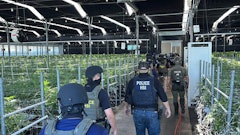
Oklahoma Gov. Kevin Stitt has signed legislation to pause medical cannabis licensing in the state.
The new law implements a two-year moratorium on medical cannabis licensing, prohibiting regulators from issuing new cultivation, processing and retail licenses from August 2022 to August 2024, according to a local KFOR report.
Current licenses will not be impacted under the measure, which Stitt signed into law May 26, the news outlet reported.
Rep. Rusty Cornwell, R-Vinita, introduced House Bill 3208 in January to give the Oklahoma Medical Marijuana Authority (OMMA) the power to implement a moratorium on licenses as regulators deem necessary.
RELATED: Oklahoma Lawmaker Introduces Bill to Pause Medical Cannabis Business Licensing
“Since 2018, Oklahoma has seen a huge number of commercial medical marijuana grows and facilities flooding into our communities,” Cornwell told Tulsa World upon introducing the bill. “In the initial rush to roll out a system for granting commercial licenses, we’ve failed to enforce their compliance with state law. House Bill 3208 would temporarily pause the issuance of commercial licenses so that we can confirm current operations are complying with the law."
























